Speakers
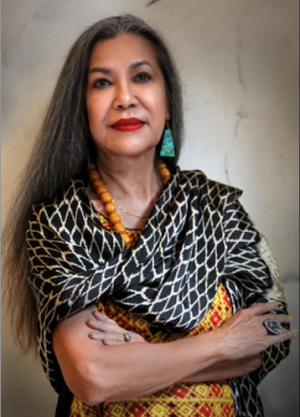
Dr. Ana Castillo is a distinguished artist, poet, novelist, essayist, playwright, short story writer, and scholar. Her works include The Mixquiahuala Letters (1986), My Father was a Toltec and Selected Poems (1988), So Far from God (1993), Massacre of the Dreamers (1995), and most recently Doña Cleanwell Leaves Home (2023), among many other publications. She is currently working on a novel tentatively titled Isabel 2121. Her accolades include being named to the Chicago Literary Hall of Fame and being a recipient of the Fuller Award for Lifetime Achievement (2022), the PEN Oakland Reginald Lockett Lifetime Achievement Award (2018), and the 2018 Mujeres Activas en Letras y Cambio Social (MALCS) Xicana Critical Thought Leader Award. For more information on Dr. Castillo, please visit her website: https://www.anacastillo.net/
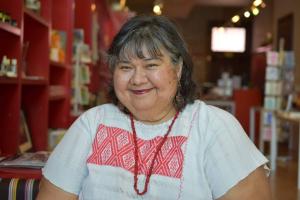
Yreina D. Cervántez has a BA in Fine Arts from UC Santa Cruz (1975), an MFA from UCLA (1989), and is Professor Emerita of the Department of Chicana/o/x Studies, California State University, Northridge. She works in painting, printmaking, and muralism. Her body of work reflects fifty years of exploration, informed by Native Mesoamerican mythology, cosmology, and spirituality, Mexican art traditions, Chicanx/Latinx poetics and Xicana feminism. She portrays issues of environmental justice, struggles for human rights, and incorporates themes of Sacred Space, specifically in regard to Xicana/Latina agency and the decolonized feminine body as contested space and site of transformation.
Cervántez has exhibited nationally and internationally, her art appears in numerous books and scholarly publications. She is in the upcoming exhibition Calli Americas, at the Oakland Museum of Art, and is a selected 2024 honoree for the Center for the Study of Political Graphics in Los Angeles.
Artist Statement:
Yreina D. Cervántez is a third-generation Chicana born in Garden City, Kansas in 1952, raised in Southern California, and currently based in Los Angeles. She works primarily in painting, printmaking, and muralism. She earned a BA in Fine Arts from UC Santa Cruz (1975) and an MFA from UCLA (1989). She is a Professor Emerita, having dedicated twenty years (1999-2019) to teaching in the Department of Chicana/o Studies at California State University at Northridge.
Through her art, teaching, and community activism, she has contributed to the discourse on an ever-evolving Chicanx aesthetic. Her body of work reflects nearly fifty years of exploration and is informed by Native Mesoamerican mythology and cosmology, Mexican art traditions, and Chicanx poetics, as well as by themes of environmental justice, and international struggles for human rights. A complex layering of symbolism and text from many sources characterizes the compositions in Cervantez's artwork; inscribed testimonies imbued with spiritual and political meanings. Ancient concepts and metaphors are combined with current issues and lived experience to create a hybrid language of contemporary glyphs, resulting in a rich visual narrative. She also incorporates themes of Sacred Space, specifically in regards to Xicana/Latina agency and the decolonized feminine body as a contested space and site of transformation. Autobiographical elements and personal/collective memory and history or “autohistoria" (as defined by writer Gloria Anzaldua), are integrated in her imagery to communicate a contemporary Xicana-Indigena feminist thought and perspective.
Cervántez has exhibited internationally, nationally, and locally in art institutions such as the Smithsonian American Art Museum, the Los Angeles County Museum of Art, UCLA at the Armand Hammer Museum and Cultural Center, the Grunwald Center for the Graphic Arts, the Skirball Center and Museum, the Los Angeles Municipal Art Gallery, the California Historical Society, and La Plaza de Cultura y Artes.
She has also participated in exhibitions at community arts venues such as Self-Help Graphics & Art, The Social and Public Arts Resource Center (SPARC), Tropico de Nopal Gallery and Art Space, the Avenue 50 Studio, and Barraza Fine Arts Gallery.
In 2017 a forty-year survey of her work was exhibited at the Vincent Price Museum of Art at East Los Angeles College. Cervántez’s work was featured in the 2020-21 exhibition ¡Printing the Revolution! The Rise and Impact of Chicano Graphics, 1965 to Now, at the Smithsonian American Art Museum.
Her art is in numerous collections including the Smithsonian American Art Museum in Washington, DC; the Los Angeles County Museum of Art in Los Angeles; the National Museum of Mexican Art in Chicago; the Blanton Museum of Art at the University of Texas, Austin; LLILAS Benson Latin American Studies and Collections, University of Texas, Austin, TX; The Tweed Museum of Art, University of Minnesota; the National Hispanic Cultural Center of Art in Albuquerque, NM; the Mexican Museum in San Francisco; SFMOMA - San Francisco Museum of Modern Art, San Francisco, CA and the Alta-Med Foundation Collection, Los Angeles, CA; Durón Family Collection, Los Angeles, CA
Yreina D.Cervántez's art has been written about and appears in numerous books and scholarly publications including: Self Help Graphics at 50, A Cornerstone of Latinx art and Collaborative Artmaking.. Tatiana Reynosa, Karen Mary Davalos, editors. Consuelo Jimenez Underwood: Art ,Vision, Weaving. Lara E. Pérez, Ann Marie Leimer, editors; Ero-Ideologies: Writings on Art, Spirituality, and the Decolonial by Laura E. Perez; Voices from the Ancestors and Beyond: Chicanx/Latinx Spiritual Expressions and Healing Practices, Edited by Lara Medina and Martha R. Gonzales; ¡Murales Rebeldes! L.A. Chicana/o Murals, Under Siege by Erin M. Curtis, Jessica Hough and Guisela Latorre; Sacred Iconographies in Chicana Cultural Productions by Clara Roman-Odio; Chicana Art: The Politics of Spiritual and Aesthetic Altarities by Laura E. Perez; Walls of Empowerment:Chicana/o Indigenous Murals of California by Guisela Latorre; Just Another Poster: Chicano Graphic Arts in California (UCSB); and The Road To Aztlan: Art From A Mythic Homeland (LACMA)
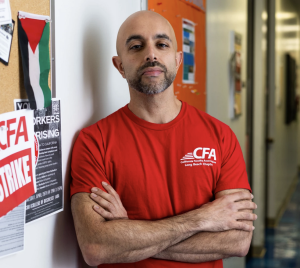
Robert Chlala is an Assistant Professor of Urban Sociology at California State University, Long Beach and Visiting Researcher at UCLA Labor Center. His work examines the ways people survive and thrive in the urban economy, in ways that engage abolition, movement-building, labor, and the creation of value. He is co-leading a first of its kind worker-led, comprehensive survey, interviews and community activations for California cannabis workers. This builds off prior research alongside workers since 2013, informing a book manuscript and graphic novel project. He completed his PhD in Sociology in 2021 at the University of Southern California, motivated by years of prior organizing alongside SWANA, LGBTQ+, migrant and youth communities. He has shared his work in different creative and academic venues, including a 3-part docuseries for We are Mitu, a recent exhibit at ONE’s CIRCA Queer Histories Festival, and geography and urban studies publications.
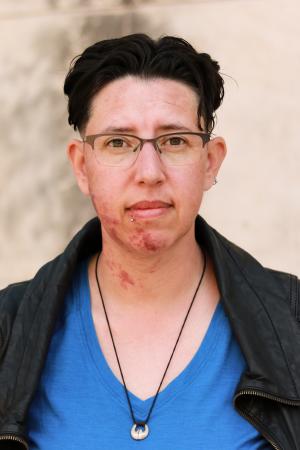
Karma R. Chávez is Chair and Bobby and Sherri Patton Professor in the Department of Mexican American and Latina/o Studies at the University of Texas - Austin. She is author of Queer Migration Politics: Activist Rhetoric and Coalitional Possibilities (University of Illinois Press, 2013); Palestine on the Air (University of Illinois Press, 2019); and The Borders of AIDS: Race, Quarantine, and Resistance (University of Washington Press, 2021). In the summer of 2019, Chávez helped to create the new Michigan State University Press journal, Rhetoric, Politics, and Culture, and she edits the Intersectional Rhetorics series at the Ohio State University Press. She is a co-founder of her university’s Faculty and Staff for Justice in Palestine.
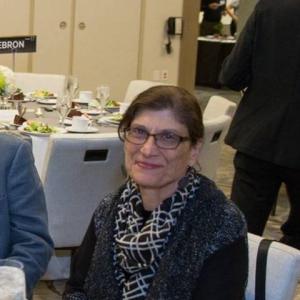
Nada Elia is Visiting Senior Scholar of American Cultural Studies at Western Washington University, where she will be joining the Department of Ethnic Studies when it launched next academic year. She is the author, most recently, of Greater Than the Sum of Our Parts: Feminism, Inter/Nationalism, and Palestine (Pluto, 2023) and is currently completing Falastiniyyat: A Century of Palestinian Feminisms (forthcoming Verson, 2025). She has contributed chapters to numerous edited volumes, including Arab and Arab-American Feminisms: Gender, Violence, and Belonging, Palestine: A Socialist Introduction, and This Bridge We Call Home: Radical Visions for Transformation. A scholar-activist, Elia has served as president of the Association for Middle East Women's Studies (AMEWS), is a core member of the Palestinian Feminist Collective (PFC), and has served on the Steering Collectives of the PFC, INCITE! Feminists of Color Against Violence, and AWSA (the Arab Women's Solidarity Association), among other grassroots organizations.
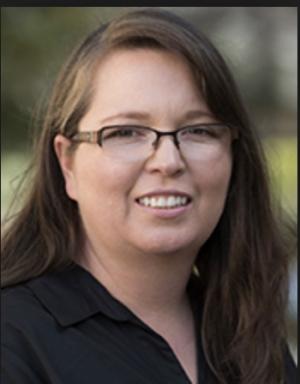
Martha D. Escobar is a Professor in the Chicana and Chicano Studies Department at California State University, Northridge (CSUN) and serves as Executive Director for Project Rebound, a campus resource for formerly incarcerated students. Escobar is the author of Captivity Beyond Prisons: Criminalization Experiences of Latina (Im)migrants (University of Texas Press, 2016), which received the National Association for Ethnic Studies’ 2017 Outstanding Book and Media Award. In this work, Escobar examines experiences of jailed, incarcerated, detained, and deported Latina (im)migrants, and maintains that imprisonment serves to construct (im)migrants as socially
under hegemonic governing logic where (im)migrants marked as “criminal aliens” are deported and banned from returning to the U.S. Her intellectual and scholarly concerns center on race, gender, sexuality, and citizenship in relation to state violence, transnational migration, and incarceration.
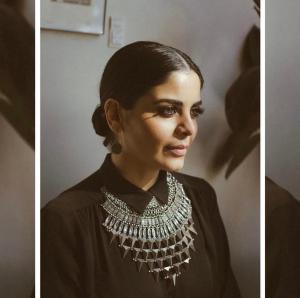
Mary Hazboun is a multidisciplinary Chicago based Palestinian artist who practices “The Art of Weeping” as an act of processing grief and somatic healing of bodies through drawing. Graduated from DePaul University in 2017 with a Master’s degree in Women’s and Gender Studies. Mary’s work highlights the nuanced traumas of women and their resistance against different forms of oppression that is manifested in the military machine, patriarchal societies, and forced migrations. She uses art as a way of emptying blocked emotions, opening internal space, and pouring in trauma-informed introspections as a form of healing. Mary was born and raised in the city of Bethlehem and moved to the U.S in 2004.
Artist Statement:
While a graduate student in Women’s and Gender Studies at DePaul University in 2015, I started doodling in class to ease the trauma flashbacks I was experiencing while reading course materials that discussed military and gendered violence. Doodling was a way for me to avoid having to leave the classroom due to being triggered. Months later, my doodles turned into sketches, and as a result, a collection of over forty complete art pieces came to life. “The Art of Weeping'' collection emerged slowly, as I was grappling with multiple traumas having lived under Israeli military occupation for twenty-one years, and later forced to migrate to the U.S in 2004.
My drawings highlight the complex and multilayered traumas of women and their resistance against the intersecting systems of oppression manifested in the military industrial complex, patriarchal societies, and forced migrations. My work is an act of decolonizing these bodies, including my own, as well as a creative form of struggle against oppression, through transgressing boundaries, making trauma visible, and linking it with collective and ancestral traumas.
My sketches have a narrative feature that recalls the complex emotions of these events. The empty backgrounds direct the viewers’ attention to the figures that are constrained within a military occupied space. The viewer must study the body language and facial expressions to gain an idea of what it means to live in a militarized zone, the resistance within the bodies, and how these meanings can be applied to other militarized zones such as Iraq, Kashmir, and Syria. So, in many ways, the viewers who see my art can relate and connect to these images depending on their location. In my work, I aim to make the trauma visible in the cramped postures representing the physical, mental, and emotional restraints they are experiencing. This near deformity occurs when bodies are situated in spaces caught between multiple forces that collectively restrain and reduce them, where their motion and mobility are restricted.
“The Art of Weeping” is unapologetically about grief; it is an invitation to start a conversation about mental health, and an in-depth exploration of how trauma shapes our bodies and psyches following traumatic experiences. It is about allowing ourselves to fully experience our grief and create a space for our heartbrokenness. It is also about cultivating resilience and hope, and uplifting women’s voices
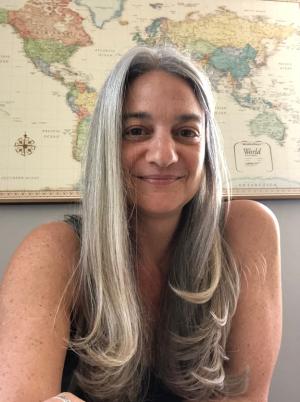
Amira Jarmakani, she/they, is Professor of Women’s, Gender, and Sexuality Studies and affiliated faculty with the Center for Islamic and Arabic Studies and LGBTQ+ studies at San Diego State University. Her most recent book, An Imperialist Love Story: Desert Romances and the War on Terror (NYU Press 2015), explores the crucial role of desire in understanding how the war on terror works and how it perseveres. She also authored Imagining Arab Womanhood: The Cultural Mythology of Veils, Harems, and Belly Dancers in the U.S. (Palgrave Macmillan 2008), which won the National Women’s Studies Association Gloria E. Anzaldúa book prize. She is co-editor, with Pauline Homsi Vinson and Louise Cainkar, of Sajjilu Arab American: A Reader in SWANA Studies (Syracuse University Press, 2022) and a Series Advisor for the Critical Arab American Studies Series with Syracuse University Press. She has served as president of the Arab American Studies Association (2018-2022), board member for the Association of Middle East Women’s Studies (2017-2019) and Assistant Editor for the Encyclopedia of Women and Islamic Cultures (2011-2013). She is an organizer with the Stop LAPD Spying Coalition and a member of the Palestinian Feminist Collective.
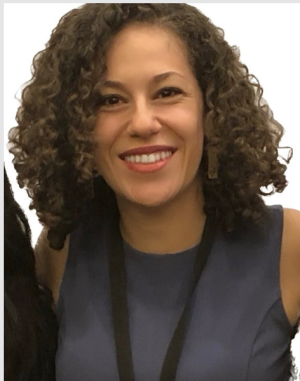
Nour Joudah is an Assistant Professor in the Department of Asian American Studies at UCLA and a former President’s and Andrew W. Mellon Postdoctoral Fellow in Geography at UC-Berkeley (2022-23). Dr. Joudah completed her PhD in Geography at UCLA (2022) and wrote her dissertation Mapping Decolonized Futures: Indigenous Visions for Hawaii and Palestine on the efforts by Palestinian and native Hawaiian communities to imagine and work toward liberated futures while centering indigenous duration as a non-linear temporality. Her work examines mapping practices and indigenous survival and futures in settler states, highlighting how indigenous countermapping is a both cartographic and decolonial praxis. She also has a MA in Arab Studies from Georgetown University and wrote her MA thesis on the role and perception of exile politics within the Palestinian liberation struggle, in particular among politically active Palestinian youth living in the United States and occupied Palestine.
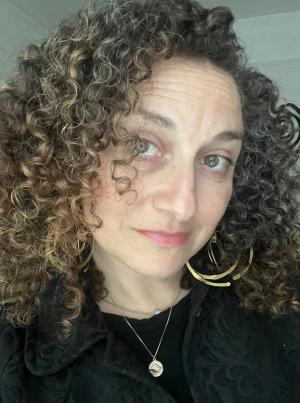
Brooke Lober is a Lecturer in Women's and Gender Studies at Sonoma State University and UC Berkeley, and a longtime activist, currently organizing with JVP-Bay Area and Faculty and Staff for Justice in Palestine, UC Berkeley; she is also a member of the collective Feminists for Justice in and for Palestine. Brooke’s oral history projects document anti-imperialist and abolitionist feminist organizing in the Bay Area in the 1980s and 90s, resulting in the website womenagainstimperialism.com and the special issue “Out of Control: Lesbian Committee to Support Women Political Prisoners” (2022), for the lesbian journal Sinister Wisdom. Brooke is a co-editor of the two-volume collection Abolition Feminisms (2022), and is currently working on a book about late 20th century Jewish feminism and (anti-)Zionism. Her essays have been published in Feminist Formations, Women’s Studies, The Journal of Lesbian Studies, Meridians, and in numerous anthologies as well as websites of radical culture.
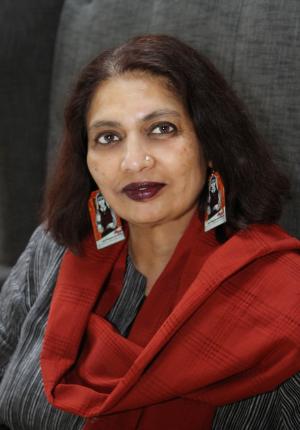
Chandra Talpade Mohanty is Distinguished Professor of Women’s and Gender Studies and Dean’s Professor of the Humanities at Syracuse University. She was a member of the Indigenous and Women of Color Feminist Solidarity delegation to Palestine in 2011 and is co-creator with Linda Carty of the Feminist Freedom Warriors digital video archive. Mohanty is author of Feminism Without Borders: Decolonizing Theory, Practicing Solidarity (Duke University Press, 2003), and co-editor of Third World Women and the Politics of Feminism (Indiana University Press, 1991), Feminist Genealogies, Colonial Legacies, Democratic Futures (Routledge, 1997), Feminism and War: Confronting U.S. Imperialism (Zed Press, 2008), and Feminist Freedom Warriors (Haymarket Books, 2018). She is a member of the advisory boards of fourteen journals including Signs, A Journal of Women in Culture and Society, Feminist Africa (South Africa), Asian Women (Korea), Feminist Economics, and The Caribbean Review of Gender Studies. Mohanty is a founding member of the Democratizing Knowledge Collective and coordinating team member of the Future of Minority Studies Research Project.
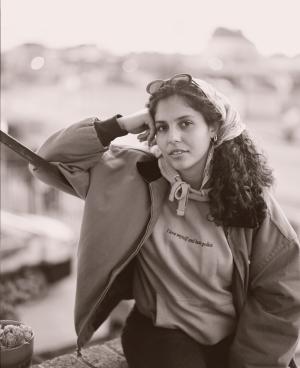
Sarah O’Neal is a queer Moroccan, Black, and Muslim artist and writer born and raised in the Bay Area. Sarah’s work grapples with the impact of colonial violence on familial memory and the way systems of oppression shape the most intimate detail of our lives. Sarah’s debut collection, Even Two Hands Pressed Together Are Split, brought together poetry, photography, and ephemera to create an immersive experience for readers to explore the way embodied trauma shapes all of our relationships. Her writing has been featured in the Institute for Palestine Studies, The Nation, and Teen Vogue. When she is not writing, you can find her scheming on the end of empire, swimming laps, or on IG and Twitter @atayqueen
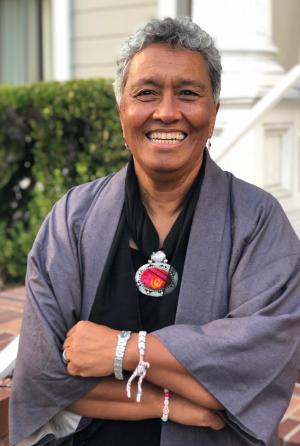
Margo Okazawa-Rey, Professor Emerita San Francisco State University, is an activist-educator and transnational feminist working on issues of militarism armed conflict, and violence against women examined intersectionally. For the past 30 years. She has long-standing activist commitments in South Korea and Palestine, working closely with Du Re Bang/My Sisters Place and Women’s Centre for Legal Aid and Counseling, respectively. She also is a founding member of the International Women’s Network against Militarism and Women for Genuine Security and is President of the Board of Directors of Association for Women’s Rights in Development (AWID). She was also a founding member of the Combahee River Collective. Her foundational life principle is that love is a radical act. She is also known as DJ MOR Love and Joy.
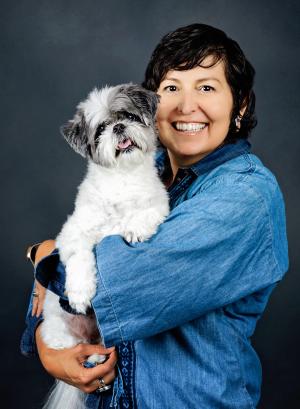
Clarissa Rojas is a scholar activist, poet, mama and movement maker. Her mother’s indigenous lineages in the Americas root her in the Arizona/Sonora deserts. Clarissa grew up in Mexicali/Calexico and San Diego/Chula Vista where she and her family migrated. She lives in unceded Huichin, a.k.a. Oakland. Clarissa is faculty in Chicanx Studies, Cultural Studies and Gender and Sexuality Studies at UC Davis. Clarissa co-founded INCITE! and has authored and co-edited multiple articles, special issues, and a book on violence and the transformation of violence, including Color of Violence: the INCITE Anthology, Community Accountability: Emerging Movements to Transform Violence and most recently her writing appears in the Journal of Lesbian Studies and Abolition Feminisms: Organizing, Survival and Transformative Practice, Truthout, and Politico.
Kimberly Robertson is a citizen of the Muscogee (Creek) Nation, an Associate Professor of American Indian Studies at California State University, Long Beach, and an artist. Her scholarship and creative practices center Native feminisms, the sexual and gendered violence of settler colonialism, ceremony, storytelling, decolonization, and Indigenous futurities. She has published in various journals such as Decolonization: Indigeneity, Education, and Society and Wicazo Sa Review, as well as peer-reviewed anthologies such as Otherwise Worlds: Against Settler Colonialism and Anti-Blackness and Keetsahnak: Our Missing and Murdered Indigenous Sisters. Her creative practices currently include screen printing, collage, beadwork, installation art, and zine-making. Her artworks have been included in numerous community, university, public, and private galleries; and peer-reviewed monographs and anthologies. She is also an active member of the Los Angeles Indian community and facilitates beading circles and art-making workshops both locally and nationally.
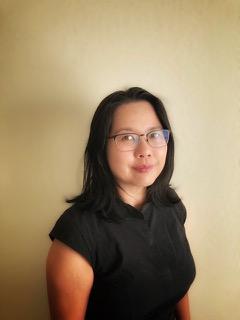
Stephanie Dimatulac Santos is a Lecturer in Cultural Studies and Global Studies at Chulalongkorn University in Bangkok, Thailand. Her current book project, Smart Labor, Smart Worker: Extraction, Resistance, and Solidarity in Digital Southeast Asia, uses ethnography, cultural analysis, and computational humanities to examine the flows of labor and capital between Southeast Asia and the Global North.
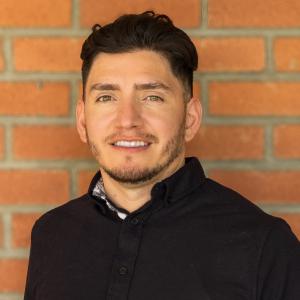
Dario Valles is an Assistant Professor in the Chicana/o and Latina/o Studies (CHLS) at California State University, Long Beach. Utilizing a lens of community-engaged cultural, linguistic, and visual ethnographic methods, Valles’ work expands queer, feminist, and migration studies and speaks to the ways Guatemalan, Salvadoran, and Honduran migrants shape new horizons of transnational solidarity, abolition, and citizenship. Valles’ current work includes a feature-length, participatory documentary entitled No Separate Survival on the global asylum crisis converging in Mexico. Additionally, his book manuscript examines comadre networks of care among Central Americans in the context of welfare state restructuring and migration in Los Angeles. His research has gained recognition from the Society of Linguistic Anthropology (SLA) and funding from the American Council of Learned Societies (ACLS), National Science Foundation (NSF), Ford Foundation, and the Wenner-Gren Foundation. His work has appeared in the Journal of Latin America Geography (JLAG) and the Political and Legal Anthropology Review (PoLAR).




